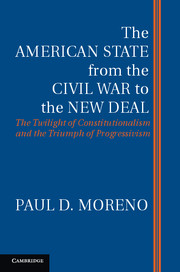 The American State from the Civil War to the New Deal
The American State from the Civil War to the New Deal Book contents
- Frontmatter
- Contents
- Abbreviations Used in the Footnotes
- Acknowledgments
- Introduction
- Part I The Old Regime
- Part II Early Progressivism
- Part III Late Progressivism
- 11 Wilsonian Progressivism
- 12 The New Freedom
- 13 The New Wilson
- 14 The Great War
- 15 The Return of the Regular Republicans
- 16 The Taft Court
- 17 The Last Progressive
- Part IV The New Deal
- Appendix A
- Appendix B
- Primary Sources
- Index
- References
12 - The New Freedom
Published online by Cambridge University Press: 05 May 2013
- Frontmatter
- Contents
- Abbreviations Used in the Footnotes
- Acknowledgments
- Introduction
- Part I The Old Regime
- Part II Early Progressivism
- Part III Late Progressivism
- 11 Wilsonian Progressivism
- 12 The New Freedom
- 13 The New Wilson
- 14 The Great War
- 15 The Return of the Regular Republicans
- 16 The Taft Court
- 17 The Last Progressive
- Part IV The New Deal
- Appendix A
- Appendix B
- Primary Sources
- Index
- References
Summary
THE TARIFF
The new president sounded like a social-justice progressive in his inaugural address. “We have been proud of our industrial achievements, but we have not hitherto stopped thoughtfully enough to count the human cost, the cost of lives snuffed out, of energies overtaxed and broken, the fearful physical and spiritual cost to the men and women and children upon whom the dead weight and burden of it all has fallen pitilessly the years through.” He promised that the government, which had been too often used for “private and selfish purposes,” would now respond to “the groans and agony of it all.” But Wilson’s legislative program, usually called “the New Freedom,” was rather modest. He led with tariff reform, among the oldest of Democratic causes. Wilson’s dramatic gesture of appearing in person before Congress to make his appeal for tariff reduction grew out of his political theory of expanded executive power and party leadership, but it also revived a practice of George Washington and John Adams. The tariff-reduction program assumed the antebellum argument that a protective tariff was unconstitutional. Some progressives disliked the Democratic position of a tariff for revenue only, since the tariff was a “regressive” tax paid by consumers. They favored an income tax to shift the burden of taxation from the poor to the rich. But the first income tax, made possible by the ratification of the Sixteenth Amendment in 1913, was only slightly more progressive than the 1894 act, exempting income under $3,000 and imposing a top rate of 7 percent on incomes over $500,000.
- Type
- Chapter
- Information
- The American State from the Civil War to the New DealThe Twilight of Constitutionalism and the Triumph of Progressivism, pp. 138 - 150Publisher: Cambridge University PressPrint publication year: 2013


